9/11’s Legacy Of Fear
The 9/11 attacks and our response to them changed America, and not for the better.
Cato Institute Vice-President Gene Healy reflects in a short piece over at Reason on the legacy of the September 11th attacks and the world that has developed in the wake of them:
Today marks the 11th anniversary of the Sept. 11th terrorist attacks. What, if anything, have we learned? In a Saturday statement, President Obama struck an upbeat note: “The legacy of 9/11,” he said, is “the ability to say with confidence that no adversary and no act of terrorism can change who we are.”
Who’s he kidding? For us ordinary schlubs who don’t own our own planes, a trip to the airport provides less reason for optimism. We shuffle shoeless through the security line, at the end of which government agents will either grope us or look at us naked. And despite his campaign trail promises to “set an example for the world that the law is not subject to the whims of stubborn rulers,” Obama has forged an expanded “Terror Presidency,” with dangerous new powers for all future presidents to wield.
Sept. 11th has changed America radically — and not for the better.
As security analysts John Mueller (a Cato senior fellow) and Mark G. Stewart point out in an important new article in International Security, it’s far from clear that any of this was necessary. Though the FBI initially insisted America was riddled with up to 5,000 trained Al Qaeda operatives, an internal agency memorandum, leaked in 2005, admitted that “To date, we have not identified any true ‘sleeper’ agents in the US.” At a certain point, Mueller and Stewart suggest, the absence of evidence becomes evidence of absence.
(…)
“In the eleven years since the September 11 attacks, no terrorist has been able to detonate even a primitive bomb in the United States,” Mueller and Stewart note.
If you’re having trouble with pipe bombs, Weapons of Mass Destruction are almost certainly beyond your competence. Though, as the authors explain, erstwhile “enemy combatant” Jose Padilla once planned a domestic nuclear attack: “His idea about isotope separation was to put uranium into a pail and then to make himself into a human centrifuge by swinging the pail around in great arcs.”
Mueller and Stewart quote anthropologist Scott Atran: “Perhaps never in the history of human conflict have so few people with so few actual means and capabilities frightened so many.” And we have erected monuments to that fear — vast bureaucratic pyramids erected in Al Qaeda’s honor.
I made a similar point last year when we marked the 10th anniversary of the September 11th attacks, and I described our decade of lost freedom:
There’s no denying that America still faces a threat from international terrorism, and that law enforcement, the military, and intelligence services need to act to protect our interests and our safety. At the same time, though, what we’ve seen over the past ten years is that the balance between liberty and safety has begun leaning far too much in the direction of safety and, as Benjamin Franklin once famously said, those who give up liberty to purchase a fleeting sense of safety don’t deserve either. My greatest fear is that we’ll see another terror attack some day in the future and see even more power granted to the state. Before that happens, we need to step back and ask ourselves whether the price we’ve paid over the past ten years was worth it.
Little has changed in the year since that was written, of course, and the prospect that the War On Terror State that we’ve created over the past eleven years will ever be scaled back becomes less and less likely with each passing year. Indeed, now that we live in a country where both major political parties seem to be willing to sacrifice civil liberties in the name of some elusive form of safety, there isn’t even a dissenting voice on these issues beyond the small number of Members of Congress and the Senate who are willing to speak out but are decidedly in the minority. On top of that, the American people seem to have come to accept, grudgingly or not, the restrictions that have been placed upon them in wake of September 11th. Indeed, even the years or complaints of abusive behavior and violations of privacy, a majority of the public says that they think that the TSA is doing a “good job.” As for the rest of it — the drone attacks, the assassination orders, the enhanced interrogations and extraordinary renditions, and the warrantless wiretaps — I honestly don’t think that most Americans care about it. They’ve been told that all of this is necessary for the sake of “safety” and, with memories of that horrible Tuesday in September still fresh in their minds, they seem unwilling to even question the necessity or efficacy of what is being done in their name. Once the government tells them that all of this is necessary to “protect” the nation, very few people seem inclined to question their leaders.
It all makes me wonder what things will look like ten years from now. The thing about a “War On Terror, ” or even just a conflict against largely stateless entities like al Qaeda, is that it’s very easy for the powers that be to claim that the threat continues to exist and that vigilance must be maintained. Any suggestion that any of these measures should be scaled back, or even merely reconsidered, is met with suggestions by those who advocate the policy that you don’t care about the safety of your fellow Americans, or even that you support the terrorists. All of this despite the fact that, as the study Healy notes discusses, the actually efficacy of many of these policies is questionable at best.
Finally, perhaps the most egregious example of the legacy of fear that the September 11th attacks helped engender can be seen in disturbing rise of Islamophobia almost immediately after the attack. It’s not unprecedented in American history, of course. In the wake of the attack on Pearl Harbor, there was an alarming rise in hatred directed not just at Japanese-Americans, but at all Asian-Americans. It resulted in people who were citizens of this nation being forced into interment camps for no justifiable reason, and it manifested itself in war propaganda in the Pacific Theater that was blatantly racist in a manner that its counterpart in the European Theater simply did not reach. Today, though, Islamophobia is something that has become rampant on the right, led by people whose names I care not repeat but which would be familiar to pretty much everyone whose been paying attention for the past decade. It manifested itself most egregiously perhaps in thinks such as the irrational protests against the construction of an Islamic Community Center at a location several blocks from the site of the 9/11 attacks and the Koran burning by a preacher from Florida that led to widespread protests in Afghanistan and elsewhere. A terrible attack eleven years ago has fanned the flames of religious hatred among a large segment of the American public, and that’s not a good thing at all.
None of this is to suggest that we shouldn’t be acting to stop those forces that would attack us at home and abroad, quite the contrary actually. At the same time we’re doing that, though, we need to be more careful than we have been these past eleven years about allowing this conflict to change us. It already has to some extent, and that’s likely irreversible at this point, but we still have the time and the wisdom to make sure that fear of the “other” doesn’t cause us to sacrifice the things that really make this country what it is.
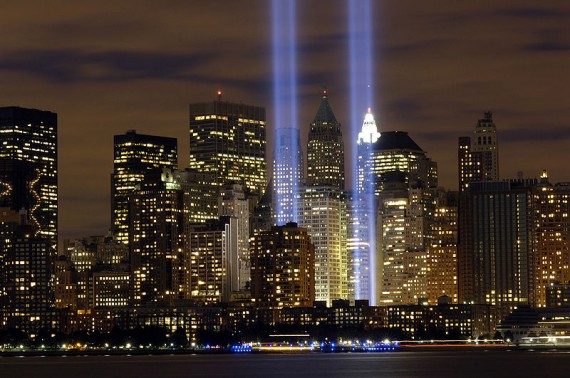

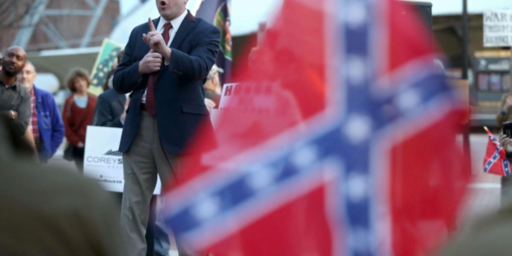
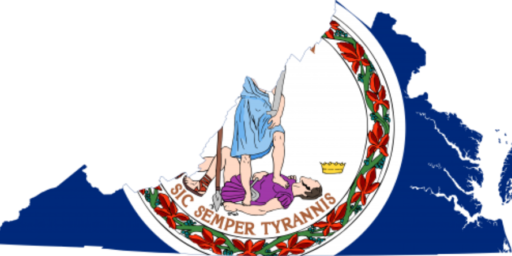
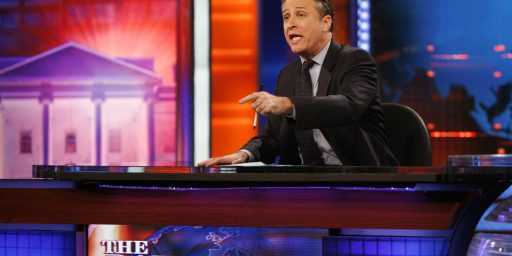
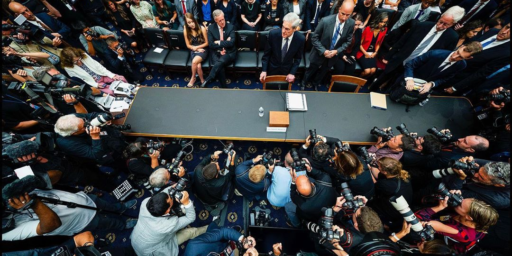
Meh. Fear is a very good motivator. It also clears out the cobwebs, if you catch my drift. Plus it’s a lot better to be deathly afraid but still very much alive than to be unafraid and, you know, dead.
Jeez Doug. Did you just wake up and notice that we are a country of cowards?
What color is our alert level today?
I don’t.
It’s not.
No. I do not catch your drift. Please. Be more specific.
Give me liberty or give me death is so pre 911.
I’d add that as Americans have become quite addicted to fear (look at local and a lot of cable “news” stories at the start of the hour), market forces have noticed and applied for lots and lots of government cash, which Congress will fall all over themselves to provide.
As most of the government contracts will be able to avoid any real auditing or financial scrutiny in the name of national security, I expect lots and lots of taxpayer money has effectively drained into a sacred sinkhole.
In my perspective, New Yorkers were much less likely to have a reactionary response to the events of 9/11/2001 than the rest of America.
Why is that?
I have been surprised and embarrassed by the cowardice of some of my fellow Americans and thier willingness to sell feedom for security.
I would welcome a federal prison for dangerous terrorist suspects in my jurisdiction. if every other state is too cowardly and fearful of their own ineptness to do the job right, send ’em to Montana, treat them with the due process all criminals deserve (hint to the cowardly: torture =/= due process) and show the world how the United States does business. And what better way to illustrate our ideals of freedom and equality by letting that mosque be built.
It is a damn shame that the previous administration and Congress stumbled as badly as they did and that this one has not done as much as it should to rectify the errors.
It’s hard to imagine the risk our ancestors took in coming to this country and traversing the continent: men, women, children, the aged, the ill. Today’s Americans would probably accuse those parents of child abuse.
It would appear that, in evolutionary terms, fearfulness outpaces fearlessness.
Since fear is so rooted in organized religion, it should come as no surprise at what we’re seeing after 9/11. It’s the carrot on a stick to control and manipulate the populace. Politicians have no incentive to back out such policies, once inserted, out of fear that the megaphone would render him or her moot….
@Tsar Nicholas:
Commenting policies prevent me from responding to odious crap.
@Tsar Nicholas: Gawd, you are such a girl.
Let me just say, here and now, that history is bigger than any one of us. Sure, you can rail against the TSA in light of the latest regulations about liquids….
But when I was trying to fly from Madrid to ATL the day after the ETA blew up the parking garage….
I just wanted to get home with my sons and my wife (and that was NOT the TSA)
I repeat…. now that a bunch of white guys are being inconvenienced by illegal searches…. THIS IS THE GREATEST ASSAULT ON CIVIL LIBERTIES SINCE….
Genghis Khan.
Go back and search the colored folks you idgits.
@OzarkHillbilly: And just in case I wasn’t clear enouigh….. Because white folks only want to kill the right folks.
@de stijl:
Things happen in the city and if you run around like a chicken with its head cut off you’re not going to be living there for very long would be my guess.
It’s really too bad that mostly non-New Yorker politicians were crapping the bed over the prospect of trials in NYC even though that’s a really good place for them, all that expertise winning convictions wasted, not to mention denying the New Yorkers a small vindication. I hate to think that fear and reflexive cowering are the legacies we leave from this thing.
Sorry Charlie. Living in abject terror may be the conservative way, but it is not the American way.
@de stijl:
New Yorkers are tougher.
I accept it as an axiom that if the name of the war has the word “on” in the phrase, then it is not real war, and is meant only to divide the population for political reasons.
@Tsar Nicholas:
So the choice is to live in fear cowering and paranoid or be dead. I think i’d rather be dead.
Living in fear is not really living.